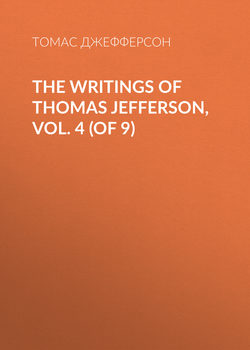Читать книгу The Writings of Thomas Jefferson, Vol. 4 (of 9) - Томас Джефферсон, Thomas Jefferson - Страница 70
TO WILLIAM B. GILES
ОглавлениеMarch 19, 1796.
I know not when I have received greater satisfaction than on reading the speech of Dr. Leib, in the Pennsylvania Assembly. He calls himself a new member. I congratulate honest republicanism on such an acquisition, and promise myself much from a career which begins on such elevated ground. We are in suspense here to see the fate and effect of Mr. Pitt's bill against democratic societies. I wish extremely to get at the true history of this effort to suppress freedom of meeting, speaking, writing and printing. Your acquaintance with Sedgwick will enable you to do it. Pray get the outlines of the bill he intended to have brought in for this purpose. This will enable us to judge whether we have the merit of the invention; whether we were really beforehand with the British minister on this subject; whether he took his hint from our proposition, or whether the concurrence in the sentiment is merely the result of the general truth that great men will think alike and act alike, though without intercommunication. I am serious in desiring extremely the outlines of the bill intended for us. From the debates on the subject of our seamen, I am afraid as much harm as good will be done by our endeavors to arm our seamen against impressments. It is proposed to register them and give them certificates. But these certificates will be lost in a thousand ways; a sailor will neglect to take his certificate; he is wet twenty times in a voyage; if he goes ashore without it, he is impressed; if with it, he gets drunk, it is lost, stolen from him, taken from him, and then the want of it gives authority to impress, which does not exist now. After ten years' attention to the subject, I have never been able to devise anything effectual, but that the circumstance of an American bottom be made ipso facto, a protection for a number of seamen proportioned to her tonnage; that American captains be obliged, when called on by foreign officers, to parade the men on deck, which would show whether they exceeded their own quota, and allow the foreign officer to send two or three persons aboard and hunt for any suspected to be concealed. This, Mr. Pinckney was instructed to insist upon with Great Britain; to accept of nothing short of it; and, most especially, not to agree that a certificate of citizenship should be requirable from our seamen; because it would be made a ground for the authorized impressment of them. I am still satisfied that such a protection will place them in a worse situation than they are at present. It is true, the British minister has not shown any disposition to accede to my proposition: but it was not totally rejected: and if he still refuses, lay a duty of one penny sterling a yard on British oznaburgs, to make a fund for paying the expenses of the agents you are obliged to employ to seek out our suffering seamen. I congratulate you on the arrival of Mr. Ames and the British treaty. The newspapers had said they would arrive together. We have had a fine winter. Wheat looks well. Corn is scarce and dear. Twenty-two shillings here, thirty shillings in Amherst. Our blossoms are but just opening. I have begun the demolition of my house, and hope to get through its re-edification in the course of the summer. We shall have the eye of a brick-kiln to poke you into, or an octagon to air you in. Adieu affectionately.
